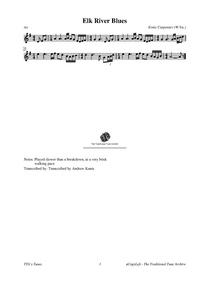Template:Pagina principale/Vetrina: Difference between revisions
No edit summary |
No edit summary Tag: Manual revert |
||
| (110 intermediate revisions by the same user not shown) | |||
| Line 1: | Line 1: | ||
{{SheetMusic | {{SheetMusic | ||
|f_track= | |f_track=Elk River Blues.mp3 | ||
|f_pdf= | |f_pdf=Elk River Blues.pdf | ||
|f_artwork= | |f_artwork=Ernie Carpenter.jpg | ||
|f_tune_name= | |f_tune_name=Elk River Blues | ||
|f_track_title= | |f_track_title=Elk River Blues | ||
|f_section=abc | |f_section=abc | ||
|f_played_by=[https://soundcloud.com/ | |f_played_by=[https://soundcloud.com/jatek-zenekar Jatek Zenekar] | ||
|f_notes= | |f_notes=Ernie Carpenter (1909-1997) | ||
|f_caption= | |f_caption=According to the booklet accompanying Carpenter's LP, the story behind the tune is one of a difficult adjustment to a forced change in Ernie's life. | ||
|f_source=[https://soundcloud.com/ | |f_source=[https://soundcloud.com/jatek-zenekar/elk-river-blues Soundcloud] | ||
|f_pix=420 | |f_pix=420 | ||
|f_picpix=200 | |f_picpix=200 | ||
|f_article=[[ | |f_article=[[Elk River Blues | '''Elk River Blues''']] | ||
Composed by Braxton County, West Virginia, old-time fiddler Ernie Carpenter (1909-1997). | |||
According to the booklet accompanying Carpenter's LP, the story behind the tune is one of a difficult adjustment to a forced change in Ernie's life. He had worked most of his life for the Pittsburgh Plate Glass Company in Clarksburg, prior to retiring in 1972 to his home in Braxton County, West Virginia. | |||
He was a regular visitor during his working years to his homeplace on the Elk River, and was witness to the planning and construction of the Sutton Dam by the U.S. Army Corps of Engineers on the river during the 1950's and 1960's. | |||
Unfortunately, this resulted in the flooding of his boyhood home and the surrounding area, despite the efforts of himself and neighbors to forestall the project through a lobbyist. He refused the government's initial offer for his land (they didn't offer him anything for his house), and took the case to court. | |||
He was able to gain a marked increase in the money he eventually was paid through this process, although he had to pay legal fees out of his pocket. He stayed in his Elk River homestead while the dam was being constructed, even though most of his neighbors had already left. Workmen blocked the roads in and out of the area, but Carpenter found alternate routes until they too were closed off. | |||
"I was the last person out of there," he said," I went ahead then and tore the old place town and brought it up here. Part of its in this house." Of the tune, he remarked: "I was sittin' here one day, an' I had the blues. I reckon as bad as anybody could, thinkin' about my old homeplace up on the Elk River. I started sawin' on the fiddle an' that's what I came up with." | |||
}} | }} | ||
Latest revision as of 16:17, 4 October 2024

Played by: Jatek Zenekar
Source: Soundcloud
Image: Ernie Carpenter (1909-1997)

Composed by Braxton County, West Virginia, old-time fiddler Ernie Carpenter (1909-1997).
According to the booklet accompanying Carpenter's LP, the story behind the tune is one of a difficult adjustment to a forced change in Ernie's life. He had worked most of his life for the Pittsburgh Plate Glass Company in Clarksburg, prior to retiring in 1972 to his home in Braxton County, West Virginia.
He was a regular visitor during his working years to his homeplace on the Elk River, and was witness to the planning and construction of the Sutton Dam by the U.S. Army Corps of Engineers on the river during the 1950's and 1960's.
Unfortunately, this resulted in the flooding of his boyhood home and the surrounding area, despite the efforts of himself and neighbors to forestall the project through a lobbyist. He refused the government's initial offer for his land (they didn't offer him anything for his house), and took the case to court.
He was able to gain a marked increase in the money he eventually was paid through this process, although he had to pay legal fees out of his pocket. He stayed in his Elk River homestead while the dam was being constructed, even though most of his neighbors had already left. Workmen blocked the roads in and out of the area, but Carpenter found alternate routes until they too were closed off.
"I was the last person out of there," he said," I went ahead then and tore the old place town and brought it up here. Part of its in this house." Of the tune, he remarked: "I was sittin' here one day, an' I had the blues. I reckon as bad as anybody could, thinkin' about my old homeplace up on the Elk River. I started sawin' on the fiddle an' that's what I came up with."
...more at: Elk River Blues - full Score(s) and Annotations
X:1 T:Elk River Blues C:Ernie Carpenter (W.Va.) M:4/4 L:1/8 R:Air N:Played slower than a breakdown, at a very brisk N:walking pace Z:Transcribed by Andrew Kuntz K:G D EG|[M:5/4]A2A3 A/B/ AG E/D/E/F/|[M:4/4]G2G3 D EG|[M:5/4]A2 A3 A/B/ AG E/D/E/F/|[M:4/4]G2 G3 G/A/ B/c/d| [M:5/4]e2 e3 e/f/ ed B/A/B/c/|[M:4/4]d2 d3B G(3A/B/d/|[M:5/4]e2 e3 e/f/ ed B/A/G/B/|[M:4/4]A4- A:|]
